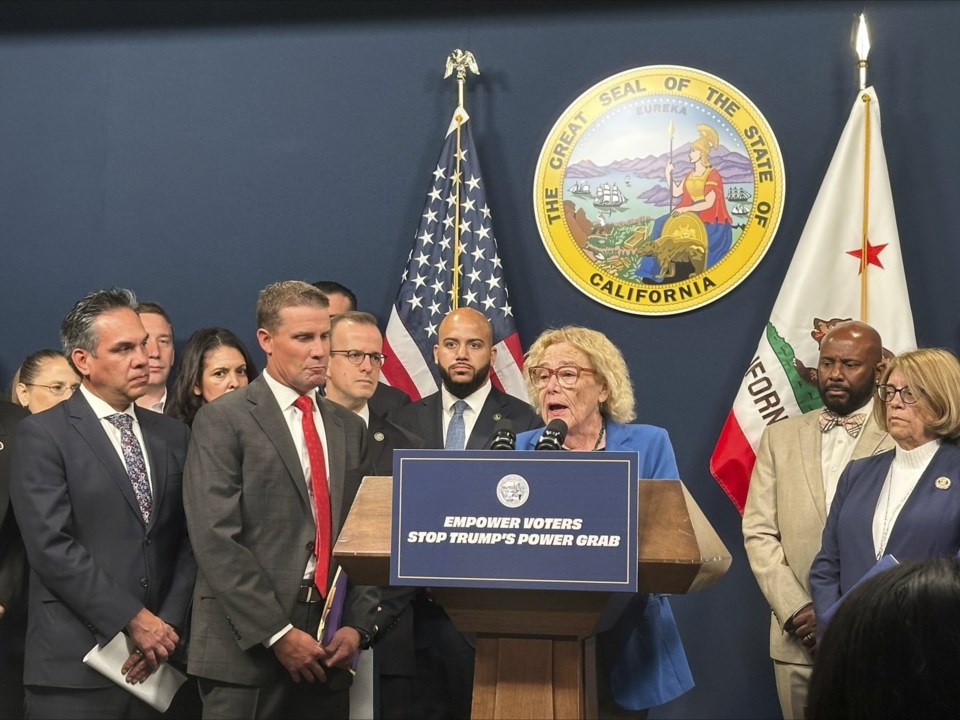SACRAMENTO, Calif. (AP) — California Democrats started a partisan push to draw new congressional districts and reshape the state’s U.S. House representation in their favor, but to pull it off, lawmakers who returned to the Capitol on Monday face a tight deadline and must still win voters’ approval.
Limits on federal immigration raids and advancing racial justice efforts are also among the hundreds of proposals the Legislature will vote on before the session ends in September.
Here's a look at what's ahead for lawmakers in their last month in session:
California's new map
Lawmakers are spending the first week back from summer break advancing the new congressional map at the urging of Gov. Gavin Newsom. Unveiled last week, the map could net Democrats five more U.S. House seats in the 2026 midterms. It's a direct response to President Donald Trump’s efforts to redraw Texas’ map to help Republicans keep their slim U.S. House majority.
So far, California is the only state beyond Texas to officially wade into the redistricting fight.
California Democrats, who hold supermajorities in both chambers, are plan to hold hearings on the map and vote to put it up for approval in a special election in November.
If voters agree, the map would replace one drawn by an independent commission that took effect in 2022. The new map would only take effect if Texas or another Republican-led state moves forward with their own mid-decade redistricting. It would remain through the 2030 elections.
Democrats said they will return the map-making power to the commission after the next census, and that the proposed map honors the Voting Rights Act and adheres to the commission’s strict criteria.
Lawmakers square off
On Monday, more than 30 Democratic state lawmakers stood with California Reps. Zoe Lofgren and Pete Aguilar to officially introduce their legislative package.
“If Trump moves forward, California will be the firewall,” said state Sen. Sebrina Cervantes.
State Republicans vowed to legally challenge the effort, arguing that voters in 2010 already decided to remove partisan influence from how maps are drawn.
Climate change
Lawmakers are weighing how to meet climate goals while lowering utility and gas prices. The issue is sharpened by the planned closures of two oil refineries that account for nearly 18% of the state's refining capacity, according to air regulators.
The legislators will debate reauthorizing the state's cap-and-trade program, set to expire in 2030. It allows major greenhouse gas emitters to buy emission allowances from the state, with fewer available over time. Revenues fund climate, affordable housing and transportation projects, as well as utility bill credits for Californians.
Newsom wants lawmakers to extend the program through 2045, direct $1 billion annually to a long-delayed high-speed rail project and set aside $1.5 billion a year for wildfire response.
Many environmental groups want changes to the program, such as ending free allowances for industrial emitters, increasing credits for low-income households, and ending an offset program.
Response to immigration raids
Lawmakers will vote on proposals responding to escalated federal immigration crackdowns in Los Angeles and across the state. One bill would make it a misdemeanor for local, state and federal law enforcement officers to cover their faces while conducting official business, with exceptions for medical masks, wildfire smoke or SWAT gear.
Proponents said it would boost transparency and prevent people from impersonating law enforcement. Opponents, including law enforcement, said the bill would disrupt local undercover operations without addressing the issue because California doesn't have authority over federal agents.
Another proposal would require law enforcement to identify themselves, and Democrats are pushing limits on immigration agents without warrants from entering schools, hospitals, and homeless or domestic violence shelters.
Racial justice
A first-in-the-nation state task force released a report in 2023 with more than 100 recommendations for repairing historic wrongs against Black Californians descended from enslaved people.
The California Legislative Black Caucus introduced a reparations package last year, but the most ambitious proposals were blocked.
This year's package introduces admissions priority at universities and reserving 10% of a first-time homebuyer fund for descendants of enslaved people, as well as $6 million for California State University research on how to confirm peoples' eligibility.
Some reparations advocates say the proposals fall short and delay implementing one of the task force's key recommendations: direct compensation.
Trân Nguyễn And Sophie Austin, The Associated Press


